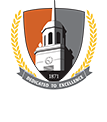What to do if you suspect a student of academic misconduct?
One of the most challenging aspects of maintaining academic integrity in the classroom is determining the appropriate course of action when academic dishonesty is detected. This generally includes speaking with the student(s) you suspect of partaking in this claimed conduct, which produces concern in both the student and the staff.
The following information is meant to help you address a student whom you suspect of academic misconduct.
1
STEP 1: Identify the type of suspected misconduct:
- Aiding in academic dishonesty
- Cheating
- Falsifying academic materials
- Misrepresenting documents
- Plagiarizing
- Purchasing/Selling of academic assignments
- Submitting previously submitted work
- other: specify
2
STEP 2: Gather evidence to support your claim. Questions to explore as you gather documentation should include the following:
- What appears to have occurred here?
- What evidence do I have to support that claim?
- Is there another conceivable explanation?
- Is there anyone else who could know about this incident?
- Was this scenario addressed in my expectations as I defined them in class or on the assignment rubric?
- Is it clearly covered in the course syllabus?
- Was this act intentional or unintentional?
3
STEP 3: Notifying the student of your claim.
- The instructor should notify the student within 10 academic days of becoming aware of the alleged incident by emailing the student’s official Buffalo State email account and attaching a copy of the academic misconduct policy.
- An example of an email can include:
- At this time, the instructor’s department chair should also be informed of the incident.
4
STEP 4: Hold a Consultative Resolution with the student (Meet with the student)
- Within 10 academic days of notifying the student (i.e., sending an email to the student indicating that you would like to discuss the matter during office hours), the instructor and the student should have a consultative resolution meeting to discuss their respective perspectives on the alleged act of misconduct.
- When confronted, students will either acknowledge their involvement or provide an explanation for the occurrences. Some explanations may quickly address the situation, while others will appear to be fabrications.
- If the student denies all wrongdoing, do not pressure them; instead, inform them of the evidence you have and the imposed sanctions. And if they would like to appeal your decision, they will have the opportunity to do so with the Academic Standards.
- Template 2&3: Students who deny responsibility and students who do not show up for the meeting.
- Please note that the Statement of Resolution is no longer used during the academic misconduct proceedings.
5
STEP 5: Notifying Academic Standards
- Notify the Academic Standards of the meeting outcome and the proposed sanctions.
- Please summarize the entire incident with the student, including dates of contact.
- Provide copies of the syllabus, test papers, assignments, or any materials pertinent to the accusations.
- Faculty who submit plagiarism cases should include excerpts from the material from which the student is accused of plagiarizing.
- Faculty can also inform us what sanctions they would like to impose.
- Sanctions will vary depending on the degree of the violation, how the class was informed of academic integrity requirements, if the act was intentional or unintentional, and the precise circumstances surrounding the occurrence.
6
STEP 6: Academic Standards and student appeal process
- Academic standards will then notify the student:
- If they did not commit an act of misconduct, committed an act of unintentional misconduct, or committed an act of intentional misconduct
- The student agrees with the faculty-proposed sanctions
- the ability and timeline to appeal the decision.
- If the student wishes to appeal this decision, the Academic Standards office will convene a meeting of the Academic Misconduct Committee to discuss the appeal.
- At the meeting, both the instructor and the student will be given the opportunity to present their stance on the case and may be questioned about it by the other individual and committee members.
- Once the instructor and the student have presented their evidence and the committee has asked its questions, the committee will engage in private deliberation.
- Academic Standards will notify the student, faculty, and the Associate Dean.
- of the committee outcome (if appealed).

